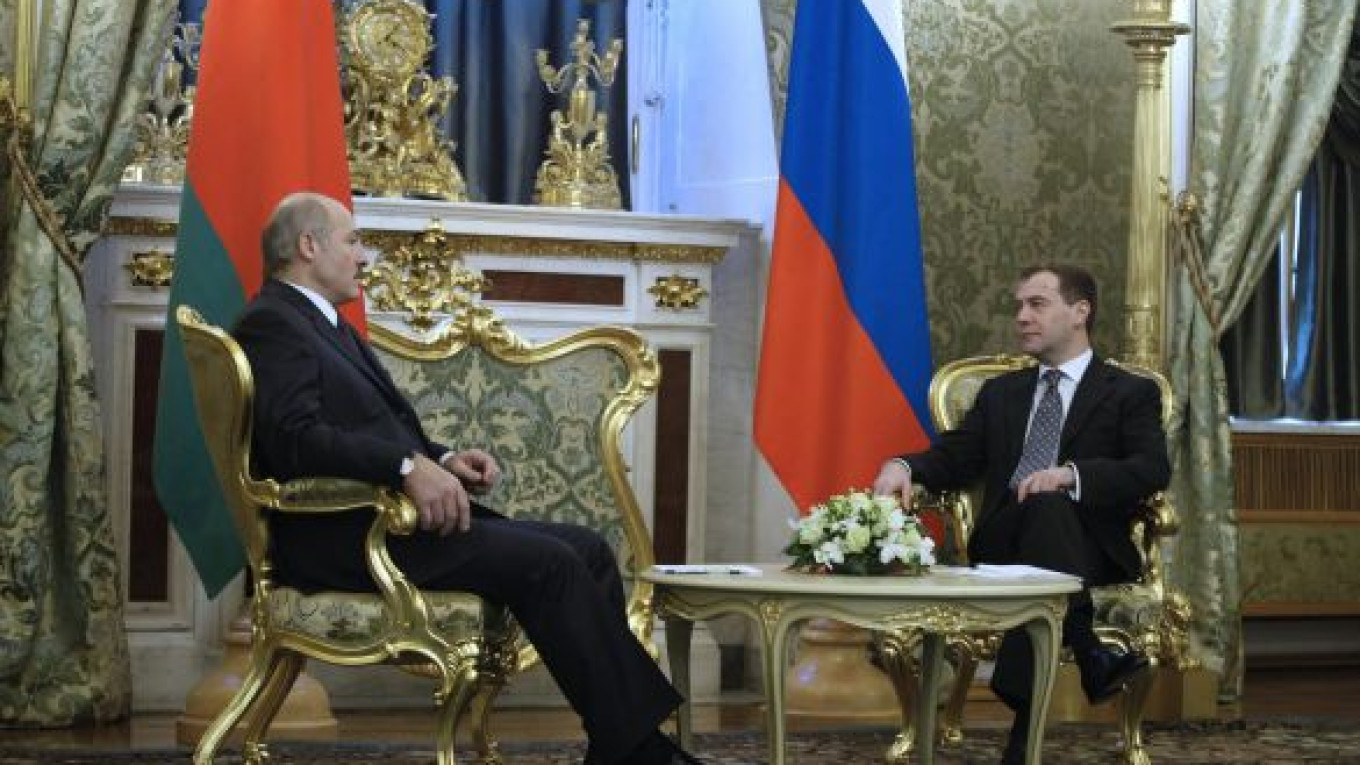Belarussian President Alexander Lukashenko came to Moscow on Thursday hoping to mend turbulent ties, and as symbol of his good intentions, gave the go-ahead for Sberbank to purchase his country’s fourth-largest bank.
President Dmitry Medvedev said their one-on-one, five-hour talks had been productive, albeit “emotional at times.” They called in their prime ministers and other officials for assistance partway through.
“During that time, we discussed our differences and tried to move the positions of the two sides closer together,” Lukashenko said after the meeting.
Medvedev said the countries could pursue a more unified foreign policy, as the presidents later opened a broader meeting of Russian and Belarussian officials that was scheduled to discuss joint foreign policy measures for the next two years.
“I hope that in this area … we will have an especially high degree of coordination,” he said, adding that the “climate of our relations” depended on the countries’ positions in the international arena.
Belarus, despite being in a formal union state with Russia, has been reluctant to follow in Russia’s footsteps and recognize two breakaway Georgian provinces as independent states. Moscow made the move after a brief war with Georgia last year.
Medvedev also said Russia would not give Belarus a hard time in their energy trade, saying the presidents agreed on certain fundamental principles in this sphere.
“At the very least, it will not create problems for our Belarussian partners and will make cooperation more up to date,” he said.
Belarus, which borrowed billions of dollars from Russia and is drawing $2.23 billion from the International Monetary Fund to prop up its struggling economy, heavily depends on deliveries of Russian oil and gas and has repeatedly asked to keep the prices below the level that Russian companies charge other consumers.
Before the visit, Lukashenko issued permission for Russia’s state-controlled Sberbank to buy Belarus’ fourth largest lender, state-controlled BPS-Bank, giving the Russian institution a foothold in one of Russia’s biggest trade partners.
Sberbank will pay $280.7 million for the bank, according to Lukashenko’s decree, Interfax reported. British investment bank NM Rothschild & Sons earlier estimated that BPS-Bank was worth from $150 million to $500 million.
Sberbank has been negotiating a purchase of the Belarussian bank, the country’s fourth largest by net assets, since last spring. Sberbank’s deputy chief executive Ilkka Salonen said he would fly to Minsk on Friday to sign the deal, Interfax reported.
As another sign of Russia’s growing influence in the neighbor’s economy, investment bank Renaissance Capital said it opened an office in Minsk on Thursday as Belarus prepares to sell assets to comply with the terms of an emergency IMF loan, Bloomberg reported.
A Message from The Moscow Times:
Dear readers,
We are facing unprecedented challenges. Russia's Prosecutor General's Office has designated The Moscow Times as an "undesirable" organization, criminalizing our work and putting our staff at risk of prosecution. This follows our earlier unjust labeling as a "foreign agent."
These actions are direct attempts to silence independent journalism in Russia. The authorities claim our work "discredits the decisions of the Russian leadership." We see things differently: we strive to provide accurate, unbiased reporting on Russia.
We, the journalists of The Moscow Times, refuse to be silenced. But to continue our work, we need your help.
Your support, no matter how small, makes a world of difference. If you can, please support us monthly starting from just $2. It's quick to set up, and every contribution makes a significant impact.
By supporting The Moscow Times, you're defending open, independent journalism in the face of repression. Thank you for standing with us.
Remind me later.


